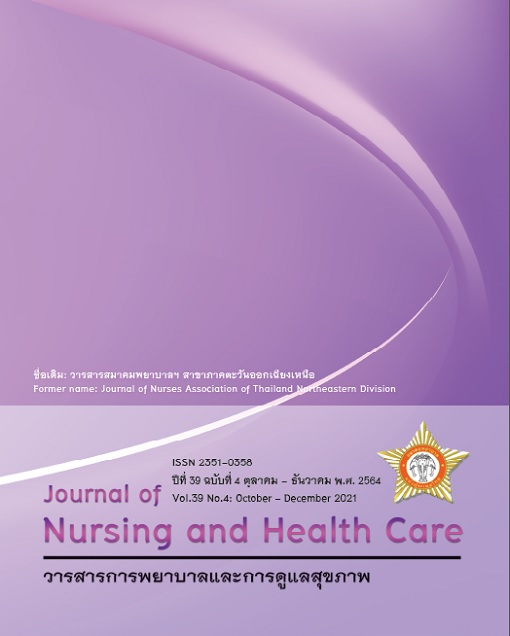การวิจัยเชิงปฏิบัติการแบบมีส่วนร่วม: พัฒนาหลักสูตรศูนย์เรียนรู้ระบบการดูแลผู้สูงอายุ ขององค์กรปกครองส่วนท้องถิ่น
คำสำคัญ:
การวิจัยเชิงปฏิบัติการแบบมีส่วนร่วม, หลักสูตรศูนย์เรียนรู้ระบบการดูแลผู้สูงอายุ, องค์กรปกครองส่วนท้องถิ่นบทคัดย่อ
การวิจัยครั้งนี้มีวัตถุประสงค์ เพื่อพัฒนาหลักสูตรศูนย์เรียนรู้ระบบการดูแลผู้สูงอายุขององค์กรปกครองส่วนท้องถิ่น ด้วยกระบวนการวิจัยเชิงปฏิบัติการแบบมีส่วนร่วม โดยใช้แนวคิดของเคมมิสและแม็คแท็กการ์ด (Kemmis & McTaggart,1988) ผู้ให้ข้อมูลหลักได้แก่ ผู้บริหารองค์กรปกครองส่วนท้องถิ่น แกนนำองค์กรท้องที่ ผู้นำชุมชน บุคลากรสุขภาพจากโรงพยาบาลส่งเสริมสุขภาพตำบล กลุ่มอาสาสมัครสาธารณสุข (อสม.) อาสาสมัครดูแลผู้สูงอายุ (อผส) ผู้สูงอายุ ผู้ดูแลผู้สูงอายุ รวมผู้ให้ข้อมูลทั้งสิ้น 40 คน การเก็บรวบรวมข้อมูลโดยการสังเกต สัมภาษณ์เชิงลึก การศึกษาวิเคราะห์เอกสาร และวิเคราะห์ข้อมูลโดยการวิเคราะห์เนื้อหา (Content Analysis) ความน่าเชื่อถือได้ของข้อมูล (trustworthiness) การตรวจสอบสามเส้า (triangulation) และการคืนข้อมูลสู่ชุมชนโดยการจัดประชาคม
ผลการวิจัยพบว่า หลักสูตรศูนย์เรียนรู้ระบบการดูแลผู้สูงอายุ ประกอบด้วย 1) วิชาหลัก 2) วิชารอง 3) วิชานวัตกรรม ซึ่งหลักสูตรศูนย์เรียนรู้ระบบการดูแลผู้สูงอายุ สะท้อนกระบวนการบูรณาการความรู้ในชุมชนท้องถิ่นกับหลักสูตรศูนย์เรียนรู้ระบบการดูแลผู้สูงอายุ และกระบวนการเรียนรู้ของชุมชน ส่งผลให้เกิดการเรียนรู้ตลอดชีวิตของผู้สูงอายุที่มีศักยภาพเพื่อให้ผู้สูงอายุได้พัฒนาไปสู่การมีชีวิตบนพื้นฐานของผู้สูงอายุที่มีคุณค่า ความต้องการของผู้สูงอายุจากหลักสูตรศูนย์เรียนรู้ระบบการดูแลผู้สูงอายุ สามารถทำให้ผู้สูงอายุเกิด ศักยภาพในการอยู่ร่วมกับผู้อื่นในสังคม และเกิดความตระหนักถึงคุณค่าของตนเองสามารถแสดงศักยภาพได้ อย่างเต็มที่ สังคมยอมรับและเป็นประชากรในวันที่มีคุณภาพ
Downloads
เอกสารอ้างอิง
2. Department of Health, Bureau of Health Ministry of Public Health, Thailand. Older person roles for social family and community [Internet]. 2016 [cited 2016 Aug 2]. Available from: http://hp.anamai.moph.go.th/soongwai/statics/about/soongwai/topic
3. Rojpaisarnkit K, Kreingkaisakda W. Development of Guidelines for Implementation of the Community for Developing Well-being of the Elderly. Journal of the Association of Researchers 2017; 22(1): 81-5.
4. Saento J, Udanon J, Darisu K. Development Guidelines for the Elderly: A Case of Narachkwai Sub-district Elderly School, Mueang District, Nakhon Phanom Province [Internet]. 2017 [cited 2019 Jan 15]. Available from: http://rajaparkjournal.com
5. Devalersakul N, Siriwarakoon W, Roadyim C. The Development of the Elderly as a Burden to Power: Case Study of Rangsit City Municipality. Veridian E-Journal, Silipakorn University (Humanities, Social Sciences and arts) 2016; 9(1): 529 – 44.
6. Anantawan T, Leethongdee S. The Implementation of Community care Model for the Elderly group in Nonsila sub-district, Sahatsakhan District, Kalasin Province. The Office of Disease Prevention and Control 7 Khon Kaen 2016; 23(2): 60.
7. Muensaen N, Kraiphibul S. Community Participation for Health Promotion of the Elderlyin Thungluke Village, Chiang Dao District, Chiang Mai Province. Nursing Journal 2014; 41: 1-12.
8. Office of the National Economic and Social Development Council. Thailand's 20-Year National Strategy [Internet]. 2018 [cited 2020 Sep 18]. Available from: http://www.nesdb.go.th/ewt_news.php?nid=7099
9. Office of the National Economic and Social Development Council. Thailand's 20-Year National Strategy [Internet]. 2020 [cited 2020 Sep 18]. Available from: http://www.nesdb.go.th/ewt_news.php?nid=7099
10. Nawawongsathea U. Curriculum Development of the Elderly School on Health Promotion for the Elderly, Social Group in Sriwilai Sub-district, Sriwilai District, Buengkan Province. Journal of Health Science and Community Public Health 2017; 1(1): 70-81.
11. Phothisita, C. Science and art of qualitative research. (8th ed.). Bangkok: Chulalongkorn University Press; 2019.
13. Wang Tha Di Sub district Administrative Organization. Workshop for developing a curriculum for the Elderly Care Learning Center, 9-10 July 2020. Nong Phai District, Phetchabun Province: Wang Tha Di Sub district Administrative Organization; 2020.
14. Tapasee W, Danpradit P, Rattanawijit S. Health Care Service Model for Elderly by Community Participation, Wangtagoo Subdistrict, Nakhon Pathom Province. Kuakarun Journal of Nursing 2017; 24: 42-54.
15. Wongprom J. Community Participation in the development of Older Persons’ Quality of Life. Veridian E-Journal, Silipakorn University (Humanities, Social Sciences and arts) 2015; 8(3): 41 – 54.
16. Boukeaw P, Teungfung R. Health Care and Health Status of Thai Aging. Journal of the Association of Researchers 2016; 21(2): 94.
17. Khampuk P. Stakeholders’ Opinion Toward Setting-up Hua-ngom Sub-district Senior Citizen School, Phan District, Chiang Rai Province. [Thesis of Master of Public Administration]. Khon Kaen: Faculty of Social Sciences, Chiang Rai Rajabhat University; 2015.
18. Chinakai E. Readiness of Community for Becoming an Elderly Communities in Loungnauae Municipality, Doisakaet District, Chiangmai Province, Thailand (Proceeding), 202– 207. 4th Annual Sustainable Rural Development Project 2014, Khon Kaen University on 11-13 June 2014.
Khon Kaen: Khon Kaen University; 2014.
19. Sapkaew Y. The Development of Quality of Life among Elderly in Aspect of Health Care Promotion, Elderly Excellent Center, Boromarajonani College of Nursing Nakhon Si Thammarat. Journal of Nursing and Education 2016; 9(2): 25-39.
20. Kamnak I, Phanlertphanij S. The Model of Participation in Elderly Health Promotion of Wat Hua Fai Elderly School, San Klang Sub-District, Phan District, Chiang Rai Province. Social Sciences Research and Academic Journal 2016; 11: 47-62.
21. Pongsaengpan P, Rodjarkpai Y. Community Participation on Elderly Health Promotion in Eastern Thailand. The Public Health Journal of Burapha University 2014; 9(2): 13-20.



